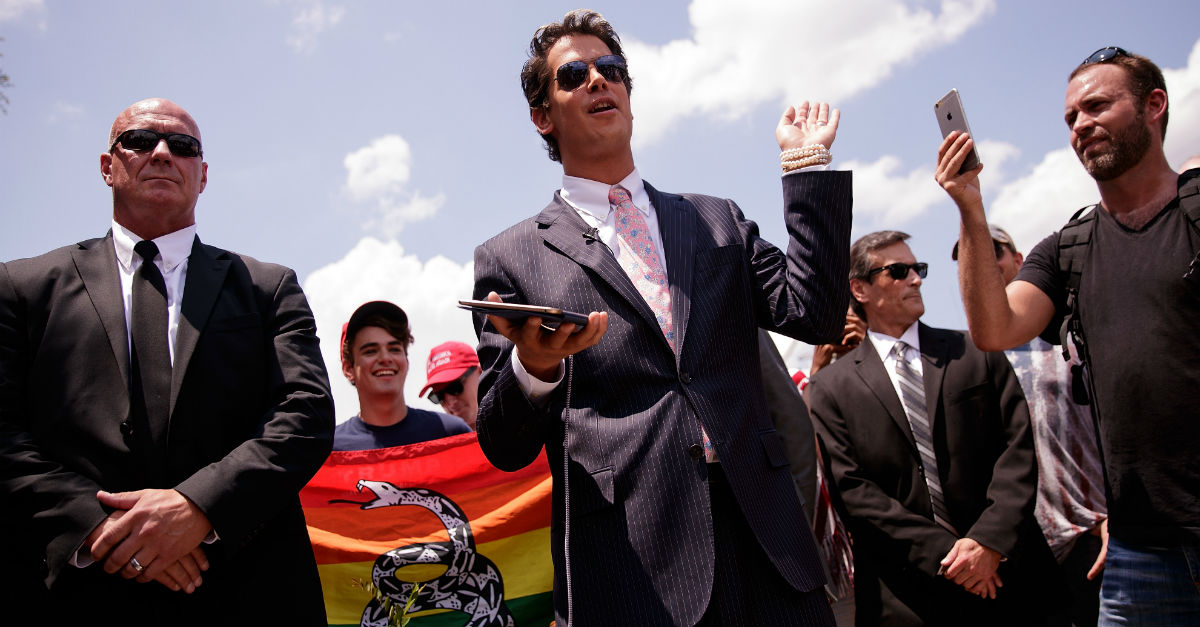The American Civil Liberties Union released a statement on Wednesday explaining their representation of Milo Yiannopoulos, the controversial former senior editor of Breitbart News.
Videos by Rare
The ACLU filed a lawsuit against the Washington Metropolitan Area Transit Authority (WMATA) on behalf of Yiannopoulos after the WMATA removed ads from Metro stations and issued refunds to the plaintiffs. WMATA took the ads down after customers complained against Yiannopoulos being allowed to advertise his book, “Dangerous.”
RELATED: Here’s why conservatives shouldn’t give up on academia
The ACLU, Carafem — a nonprofit that provides abortion services — and PETA are also plaintiffs in the suit. WMATA took down ads representing the aforementioned organizations because they “violated” policies.
“By rejecting these ads and accepting ads from gambling casinos, military contractors, and internet sex apps, WMATA showed just how subjective its ban is,” the ACLU said. “Even more frightening, however, WMATA’s policy is an attempt to silence anyone who tries to make you think. Any one of these advertisements, had it passed WMATA’s censor, would have been the subject of someone’s outraged call to WMATA.”
“So, to anyone who’d be outraged to see Mr. Yiannopoulos’ advertisement — please recognize that if he comes down, so do we all. The First Amendment doesn’t, and shouldn’t, tolerate that kind of impoverishment of our public conversation. Not even in the subway.”
The statement addressing the representation of Yiannopoulos, written by James Esseks, the Director of the ACLU’s LGBT & HIV Project, argues that “free speech protections fuel civil rights movements.”
Esseks calls Yiannopoulos a “professional provocateur,” but nonetheless maintains his constitutional right to free speech.
“Here at the ACLU, we vehemently disagree with Mr. Yiannopoulos’ views,” Esseks said. “We work hard, every day, with the very communities he targets, to fight for equal rights and dignity for all. We recognize that his words cause grievous pain to many individuals, their families, and their loved ones. Speech like his hurts.”
Esseks went on to say that the suppression of speech like Yiannopoulos’ endangers everyone.
“If First Amendment protections are eroded at any level, it’s not hard to imagine the government successfully pushing one or more of those arguments in court.”
By representing Yiannopoulos, Esseks says the ACLU is standing firm in their belief that free speech aids in the progression of civil rights movements.
RELATED: One police officer’s feelings are all it takes to get charged for drug use in America
“The constitutional principle here, of course, is that government can’t censor our speech just because it doesn’t like what we say,” Esseks continued. “But we’re not representing Mr. Yiannopoulos just out of an abstract principle. We’re also representing him because free speech is crucial to progress in civil rights movements.”
Esseks pointed to instances where free speech advanced particular movements, such as LGBT rights and the NAACP.
“Without free speech protections, all civil rights advocacy could be shut down by the people in power, precisely because government doesn’t agree with the ideas activists advance. That was true of the civil rights fights of the past, it’s true of the movements facing pitched battles today, and it will be true of the movements of the future that are still striving to be heard.”



